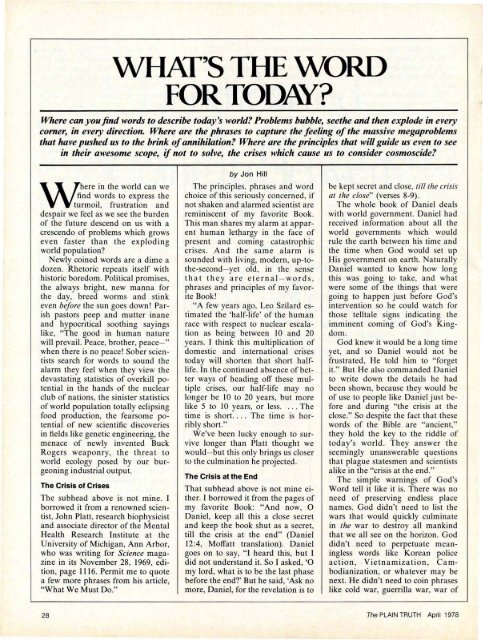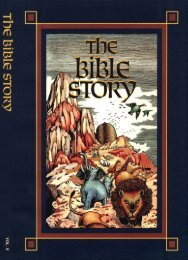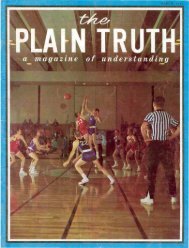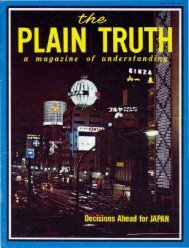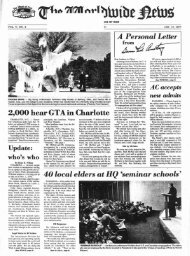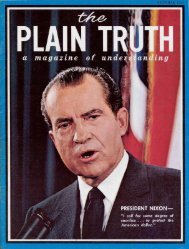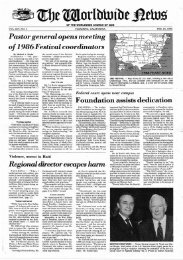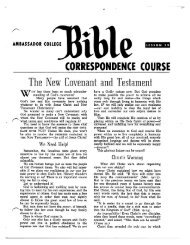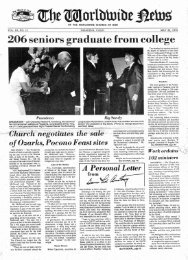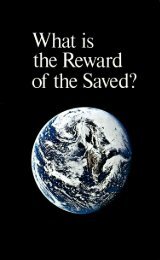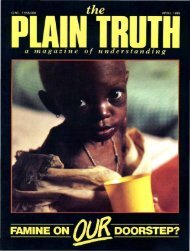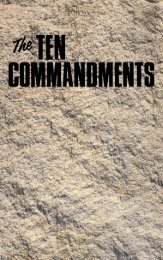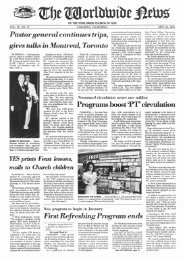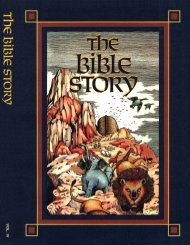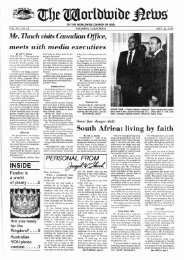Plain Truth 1978 (Prelim No 04) Apr - Herbert W. Armstrong
Plain Truth 1978 (Prelim No 04) Apr - Herbert W. Armstrong
Plain Truth 1978 (Prelim No 04) Apr - Herbert W. Armstrong
You also want an ePaper? Increase the reach of your titles
YUMPU automatically turns print PDFs into web optimized ePapers that Google loves.
WHAT'S THE WORD<br />
FORTODAY?<br />
Where can you find words to describe today 's world? Problems bubble, seethe and then explode in every<br />
corner, in every direction. Where are the phrases to capture the feeling ofthe massive megaproblems<br />
that have pushed us to the brink ofannihilation? Where are the principles that will guide us even to see<br />
in their awesome scope, if not to solve, the crises which cause us to consider cosmoscide?<br />
W<br />
here in the world can we<br />
find words to express the<br />
turm oil, frustration an d<br />
despair we feel as we see the burden<br />
of the future descend on us with a<br />
crescendo of pro blems which grows<br />
eve n faste r th an th e ex plod ing<br />
world populat ion?<br />
Newly coined words are a dim e a<br />
dozen. Rhetoric repeats itself with<br />
historic boredom. Political prom ises,<br />
the always bright, new manna for<br />
the day, breed worms and stink<br />
even before the sun goes down! Parish<br />
pastors peep and mutter ina ne<br />
and hypocritical soothing sayings<br />
like, "The good in hum an nature<br />
will prevail. Peace, brother, peace- "<br />
when there is no peace! Sober scientists<br />
search for words to sound the<br />
alarm they feel when they view the<br />
devastating statistics of overkill potent<br />
ial in the hands of the nuclear<br />
club of nations, the sinister statistics<br />
of world population totally eclipsing<br />
food produ ction, the fearsome potent<br />
ial of new scientific discoveries<br />
in fields like genetic engineering, the<br />
menace of newly invented Buck<br />
Rogers wea po nry, th e threat to<br />
world ecology posed by our burgeoning<br />
industrial output.<br />
The Crisis of Crises<br />
The subhead above is not mine. I<br />
borrowed it from a renowned scientist,<br />
John Platt , research bioph ysicist<br />
and associate director of the Mental<br />
Health Research Institute at the<br />
University of Michigan , Ann Arbor,<br />
who was writing for Science magazine<br />
in its <strong>No</strong>vember 28, 1969, edition<br />
, page 1116. Perm it me to qu ote<br />
a few more phrases from his article,<br />
"What We Must Do."<br />
28<br />
by Jon Hill<br />
The principles, phrases and word<br />
choice of this seriously concerne d, if<br />
not shaken and alarmed scientist are<br />
reminiscent of my favorite Book.<br />
Th is man shares my alarm at apparent<br />
hum an lethargy in the face of<br />
present and coming catastrophic<br />
cri ses. And the sa me alarm is<br />
sounded with living, modern , up-tothe-second<br />
- yet old, in the sense<br />
th a t th ey a re e te r na l-words,<br />
phrases and prin ciples of my favorite<br />
Book!<br />
"A few years ago, Leo Szilard estimated<br />
the 'ha lf-life' of the hum an<br />
race with respect to nuclear escalation<br />
as being between 10 and 20<br />
yea rs. I think this multiplicat ion of<br />
domestic and interna tiona l crises<br />
today will shorten that short halflife.<br />
In the continued absence of better<br />
ways of head ing off these multiple<br />
crises, our half-life may no<br />
longer be 10 to 20 yea rs, bu t more<br />
like 5 to 10 yea rs, or less. . . . The<br />
time is short. . . . Th e time is horribly<br />
short."<br />
We've been lucky enough to survive<br />
longer than Platt thought we<br />
would- but this only brings us closer<br />
to the culmination he projected.<br />
The Cri sis at the End<br />
Th at subhea d above is not mine either.<br />
I borrowed it from the pages of<br />
my favorite Book: "And now, 0<br />
Daniel, keep all this a close secret<br />
and keep the book shut as a secret,<br />
till the crisis at the end" (Da niel<br />
12:4, Moffatt translation). Dani el<br />
goes on to say, "I heard this, but I<br />
did not understand it. So I asked , '0<br />
my lord, what is to be the last phase<br />
before the end?' But he said, 'Ask no<br />
more, Daniel , for the revelation is to<br />
be kept secret and close, till the crisis<br />
at the close" (verses 8-9).<br />
Th e whole book of Daniel deals<br />
with world government. Dan iel had<br />
received information about all the<br />
world governments which would<br />
rule the earth between his time and<br />
the time when God would set up<br />
His govern ment on earth. Naturally<br />
Dan iel wanted to know how long<br />
this was going to take, and what<br />
were some of the things that were<br />
going to happen ju st before Go d's<br />
intervention so he could watch for<br />
those telltale signs indicat ing the<br />
imminent coming of God's Kingdom.<br />
Go d knew it would be a long time<br />
yet, and so Dani el would not be<br />
frustrated, He told him to "forget<br />
it." But He also commanded Dan iel<br />
to write down the details he had<br />
been shown, because they would be<br />
of use to people like Dan iel j ust before<br />
and during "the crisis at the<br />
close." So despite the fact that these<br />
words of the Bible are "ancient,"<br />
they hold the key to the riddle of<br />
tod ay's world. Th ey answer th e<br />
seemingly unanswerable que stions<br />
that plagu e statesmen and scientists<br />
alike in the "crisis at the end."<br />
The simp le warnings of Go d's<br />
Word tell it like it is. There was no<br />
need of preserving endl ess place<br />
nam es. God didn't need to list the<br />
wars that would qui ckly culm inat e<br />
in the war to destroy all mank ind<br />
that we all see on the horizon. Go d<br />
didn 't need to perp etuate meaningless<br />
words like Kore an police<br />
action, Vietnamization, Ca mbodi<br />
anization, or whate ver may be<br />
next. He didn 't need to coin phrases<br />
like cold war, guerrilla war, war of<br />
The PLAIN TRUTH <strong>Apr</strong>il <strong>1978</strong>


